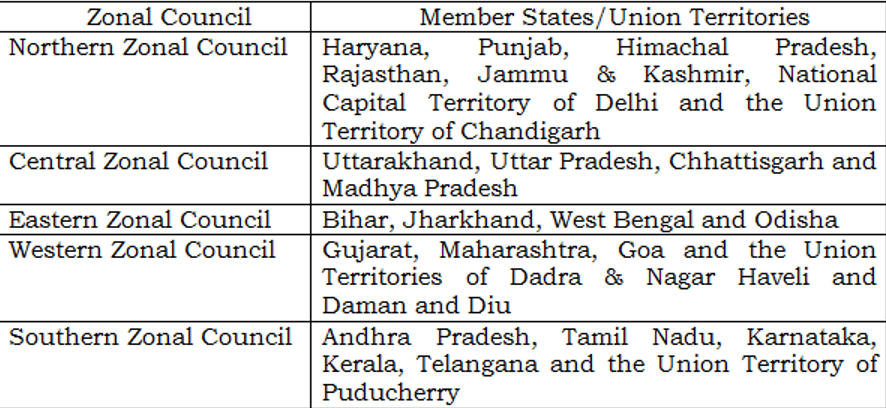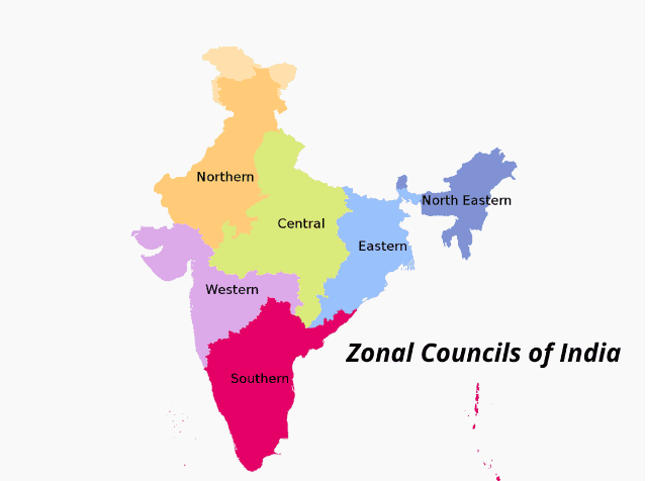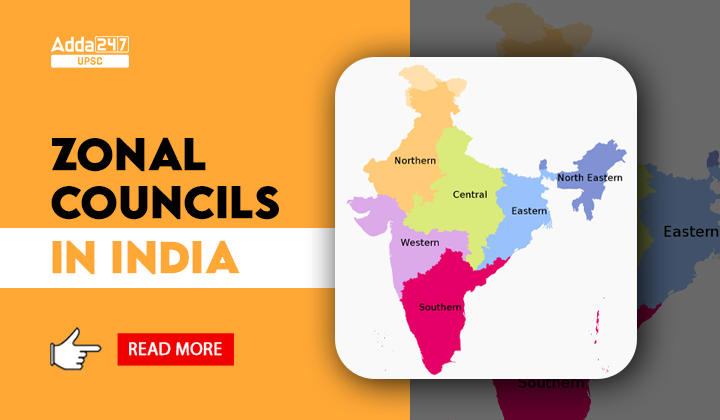Table of Contents
Zonal Councils in India: In India’s diverse and vast landscape, effective governance necessitates a balance between centralization and decentralization. To address this need, the concept of Zonal Councils was introduced, laying the foundation for collaborative governance across the nation. In this article, you can check complete details about Zonal Councils in India.
Zonal Councils in India Historical Evolution
- Genesis: Zonal Councils were established under the States Reorganization Act of 1956 to promote cooperation and coordination among states, ensuring regional balance.
- Five Zones: India is divided into five zones, each comprising states and union territories. These are— Northern, Central, Eastern, Western, and Southern Zones.

- Balancing Act: The establishment of Zonal Councils aimed to mitigate regional disparities, and linguistic barriers, and foster a sense of unity in diversity.
Zonal Council Organizational Structure
- Composition: Each Zonal Council is headed by a Union Home Minister and consists of Chief Ministers and two Ministers from each member state, along with administrators from union territories.
- Advisory Role: The Vice-Chairman, who is usually the Chief Minister of the host state of the council’s meeting, plays an advisory role in its proceedings.
- Joint Consultative Mechanism: The Chief Secretaries of the states and union territories, along with other senior officials, constitute the standing committee to deliberate on various issues.

Zonal Council Members’ Involvement
- Chief Ministers: Chief Ministers’ active participation fosters collaboration and facilitates the exchange of ideas, experiences, and best practices.
- Union Territories: Union territories contribute to discussions, ensuring that even smaller regions have a voice in policy formulation.
- Joint Efforts: Members discuss and resolve inter-state disputes, formulate common policies, and work towards development and security.
Zonal Council Roles and Responsibilities
- Cooperative Federalism: Zonal Councils exemplify the principles of cooperative federalism by acting as platforms for center-state and inter-state discussions.
- Policy Formulation: They aid in formulating policies that address shared challenges, such as regional development, water resources, and social welfare.
- Conflict Resolution: Zonal Councils facilitate conflict resolution among states, mitigating differences that could impede progress.
- Plan Implementation: They ensure that national plans are effectively implemented at the regional level, considering the unique needs of each zone.
- Cultural Exchange: Zonal Councils also foster cultural exchanges, strengthening the cultural fabric of the nation through the promotion of regional languages and traditions.
Zonal Council Challenges and Way Forward
- Limited Legal Authority: Zonal Councils lack binding decision-making power, limiting their effectiveness in dispute resolution and policy implementation.
- Uneven Participation: Varying levels of engagement among states can hinder the achievement of the councils’ objectives.
- Political Differences: Political differences among member states can impede consensus on important issues.
- Empowerment Needed: Granting Zonal Councils more legislative and financial powers can enhance their role in regional development.
- Digital Integration: Utilizing technology for virtual meetings and information sharing can improve efficiency.
Zonal Councils Success Stories
- North-Eastern Region: Zonal Councils have been instrumental in addressing the unique challenges of the North-Eastern states, fostering connectivity and development.
- Water Management: Collaborative efforts through Zonal Councils have led to better water resource management, mitigating conflicts over shared rivers.
- Infrastructure Development: Joint initiatives have propelled infrastructural growth, especially in border areas, enhancing security and connectivity.
Conclusion
The establishment of Zonal Councils stands as a testament to India’s commitment to unity in diversity and cooperative federalism. Despite the challenges, these councils have been crucial in fostering inter-state cooperation, policy formulation, and conflict resolution. As India advances into a new era, empowering Zonal Councils could lead to more balanced and inclusive development across the nation. Through strengthened legislative authority and enhanced digital integration, Zonal Councils can transcend their current limitations and play an even more pivotal role in shaping India’s growth story.
| Relatable Articles | |
| Emergency in India | Centre State Relations |
| Special Provisions Act | Cooperative Societies |




 TSPSC Group 1 Question Paper 2024, Downl...
TSPSC Group 1 Question Paper 2024, Downl...
 TSPSC Group 1 Answer key 2024 Out, Downl...
TSPSC Group 1 Answer key 2024 Out, Downl...
 UPSC Prelims 2024 Question Paper, Downlo...
UPSC Prelims 2024 Question Paper, Downlo...




